Funding dispute in Haverhill and Woodsville draws comparisons to ‘the North and the South’
| Published: 04-12-2024 9:31 PM |
HAVERHILL — At last month’s Town Meeting, Haverhill voters were asked to appropriate $5,000 to a nonprofit that gives backpacks filled with school supplies to New Hampshire children entering foster care.
“This is my charity,” said then-Town Manager Brigitte Codling of the organization “Caring Cases” that she started with her husband. They were inspired by their own experience of adopting two foster kids, she explained.
A majority of the voters in the gym of the Haverhill Cooperative Middle School, unmoved by Codling’s appeal, rejected the funding in a loud chorus of nays. But the spurning of Caring Cases — it was the only one of six nonprofit appropriations that didn’t pass — isn’t particularly surprising.
Earlier that week, voters had rejected Codling too.
By ballot, town residents eliminated the position of town manager, 361-323, ostensibly throwing Codling out along with it. The vote transferred duties of the former town manager’s position to the five-member Haverhill Selectboard. In the town manager form of government, Codling was overseeing the town’s daily operations, including the hiring of department heads.
While the article, brought by petition onto the warrant, didn’t mention her by name, Codling’s five-year tenure as manager had been plagued by a series of lawsuits, personal threats and other attempts to expel her.
“The people in town spoke up and wanted to get her out of town government,” said Steve Wheeler, chair of the Woodsville Precinct Commissioners, the village’s governing body of three elected officials. “That’s the reason they changed it, the form of government.”
Village districts, as they’re known under New Hampshire law, have a separate layer of governance on top of their town’s. Of the four villages in Haverhill, Woodsville is home to about a third of the town’s 4,600 residents, as well as its high school and numerous businesses.
Article continues after...
Yesterday's Most Read Articles
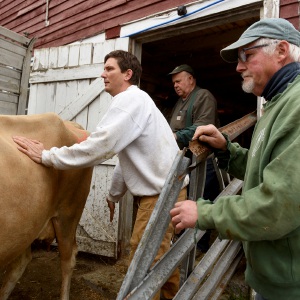 Herd departs Hartford’s last remaining dairy farm
Herd departs Hartford’s last remaining dairy farm
 Bald eagles are back, but great blue herons paid the price
Bald eagles are back, but great blue herons paid the price
 At Dartmouth, hundreds protest ongoing war in Gaza and express support for academic freedom
At Dartmouth, hundreds protest ongoing war in Gaza and express support for academic freedom
 Kenyon: What makes Dartmouth different?
Kenyon: What makes Dartmouth different?
 A Life: Richard Fabrizio ‘was not getting rich but was doing something that made him happy’
A Life: Richard Fabrizio ‘was not getting rich but was doing something that made him happy’
A dispute about funding between Haverhill and Woodsville is at the heart of much of the contention surrounding Codling.
“It’s just turmoil, and it’s been turmoil since she came here in 2019,” Wheeler said. “I’ve lived in this town for over 50 years. I’ve never seen this town in disarray like it is now.”
But the public contempt does little, at least outwardly, to sway Codling, 52, said Ron Hurlburt in an interview. Hurlburt, a resident of North Haverhill, spoke in defense of Codling from the floor at Town Meeting. “She’s a very bright, intelligent and decent woman, and I like her a lot,” Hurlburt said. Plus, he added, “she’s got leather skin.”
She’ll continue to put it to use.
On Sunday, a Facebook post from the Selectboard announced that Codling had accepted the position of Haverhill town administrator.
“She brings a wealth of knowledge of municipal government, management practices and procedures to the town,” the announcement read. “This is an excellent opportunity to move our community forward with the Select Board becoming more involved with the day-to-day operations of our town!”
There was no outside search for another person to fill the role, said Selectboard member Theresa Paige at a meeting on Monday. As town administrator, Codling receives a $108,000 salary, the same she did when she was town manager. “The workload for the town administrator will not change,” Paige said.
Codling noted that she is keeping the $97,455 buy-out payment of her manager contract, which she said is made up of six months of salary and unused accrued leave balances.
While she will have considerably less power to make decisions for Haverhill, Codling will continue to preside over the town that tried to oust her.
Comments on the Facebook post announcing her reappointment were turned off.
When Codling was hired as town manager in 2019, she moved her husband and five kids to Bath, N.H. from Cabot, Vt., where she’d worked for the Vermont Agency of Transportation for nearly two decades, and served on the Selectboard.
“I don’t want to leave Haverhill,” Codling said at the Little Grille in Bradford, Vt., earlier this month. “It’s a beautiful place, and there are truly some wonderful people.”
She performed a sort of verbal autopsy of the past half-decade, which she said has been a “wild ride.”
Codling brought a green manilla folder to the interview. It contained the petition, signed by 33 people, to have her position nixed. She also shared her six-page resume, nearly a dozen glowing professional references, and her most recent annual performance evaluation report from the Town of Haverhill, which marked her performance as “excellent” (third on a four tiered scale of “unsatisfactory” to “outstanding”).
Her tenure is neatly summed up in a document, also included in the folder, entitled “The past five years…” In it, Codling mentions only briefly the series of lawsuits regarding funding for Woodsville that have clouded her time in Haverhill and tarnished her reputation among many residents.
Districts are created to perform specific municipal operations for their residents. The Woodsville Fire District runs a highway and fire department for the village, and is subject to its own taxation to fund those departments, as well as taxation from the town.
In 1990, based on nearly a century of precedent, the New Hampshire Legislature passed a bill that mandated the Town of Haverhill to fund the Woodsville Highway Department.
When Codling arrived, she determined the funding formula had been miscalculated, and that large sums of money had been overpaid to the department.
“I thought, ‘the agreements we have with other districts don’t look like this,’” she said. Woodsville is the only district that requests funding from the town for its operations, she said.
In 2020, a letter from the town’s attorney alerted the district that the town had changed the way funding was distributed, and it was demanding the return of excess money.
The letter stated that between 2016 and 2018, Woodsville had received over $650,000 in excess funding for its highway operations, and pointed out that according to the district’s highway operating budget in that time period, “it is purportedly expending approximately $50,000 per year per mile of road” while the Town historically averages $10,000 per year per mile.
The district responded a week later through its own attorney, writing that the attempt to recalculate the funding was “artificial” and unlikely to be “sustained in a court of law.”
The Woodsville Fire District then sued the town for changing the allocation of funds. Two years later, the town and the district settled for $490,000, which has largely been funding the highway department since, said Woodsville Village Administrator Kevin Shelton.
Before the settlement, Gov. Chris Sununu signed a bill that struck down the requirement for the Town of Haverhill to fund the district’s highway operation.
But at Town Meeting in 2022, residents approved funding for Woodsville highway and fire departments by voting through two petitioned articles.
The move, Codling wrote to the Selectboard in an email afterward, would raise taxes for Haverhill residents by $161 dollars on a $150,000 home, and decrease taxes for Woodsville residents by $556 on a property of the same value.
The New Hampshire Department of Revenue Administration subsequently disallowed those articles. The district then appealed the department’s decision to the New Hampshire Supreme Court. Its case was heard in January, and Woodsville is expecting to be notified of the decision “any day,” said Wheeler, the commissioner.
If the state’s highest court rules in Woodsville’s favor, the district will receive the $466,619 and $146,974 that voters approved at the 2022 Town Meeting for its highway and fire departments, respectively.
“The Woodsville Fire District should not have its cake and eat it too,” former state Sen. Bob Giuda worte in an email days after the meeting to James Gerry, director of the municipal finance division of the revenue administration. Giuda, a Republican representing Haverhill’s district, helped craft the legislation that struck down the funding mandate.
“Having the town fund Woodsville’s Highway Department and/or Fire Service Division operation places the burden of funding the municipal operation of one political subdivision (Woodsville) on the taxpayers of a different political subdivision (Haverhill), but denies the Town authority or accountability for the expenditure of those funds,” he wrote.
The passage of the articles funding the highway and fire departments, Giuda added, flies in the face of the legislation he’d worked to pass. The “underlying intent,” he wrote, was to end the requirement of Haverhill residents to pay for the Woodsville Fire Precinct’s operations.
Woodsville district officials view things differently.
“If we’re funding our own highway department with no assistance, then we are funding two highway departments,” said Shelton, the village administrator. “Because every resident of the precinct pays the town tax too. And the original legislation just gave some of that back. As opposed to the town giving us money, it really wasn’t that. They were returning money.”
On a personal level, the upheaval created a firestorm for Codling. When she and other employees began digging into the funding, “almost immediately I started getting attacked,” she said.
In July 2021, she opened an anonymous package mailed to her at the town office, sending out a burst of “penis confetti,” according to Haverhill police records. A digital link included in the box led to a message reading “Karma. The past will always surface. Have a great day.”
While the police determined the incident wasn’t a crime, it was in line with a general air of antagonism toward Codling at that time.
“A lot of people told me to carry a gun,” she said. “And I still do.”
In 2022, tensions peaked as a new Selectboard, leaning more heavily in Woodsville’s favor, began communicating with an attorney behind Codling’s back regarding the petitioned articles. Codling accused board members of usurping her authority and not governing transparently.
For its part, the board said that she improperly influenced the state’s Department of Revenue Administration in its decision to disallow the appropriations, according to emails among the board members since made public.
“It was the worst year of my career, of my life,” Codling said.
Still, she stands by her work to change the funding.
“There were millions of dollars that, in my opinion, had been overpaid to Woodsville,” she said. “You can try to do all the right things for all the right reasons, following all the protocols you’ve been taught as a business manager. But if it ruffles the wrong feathers, watch out.”
The Woodsville Highway Department continued to rely on the money received from the town through the initial lawsuit settlement. Meanwhile, repeated petitions from residents year after year tried, and at that time failed, to cleave Codling from Haverhill government.
One such article at the 2023 Town Meeting advised the Selectboard to “immediately” terminate Codling’s contract as town manager. “We strongly feel she no longer serves the interest of the town and its residents,” it read. The proposal was defeated, 169-135.
Allowing Codling to serve as town administrator “will be a disaster,” said John Nelepovitz, a Planning Board member.
He signed this year’s petition, as well as ones before it, and said he’s “very disappointed” in the Selectboard for appointing Codling to the new position.
“They’re not honoring the vote of the voting public,” Nelepovitz said. “That’s what we were afraid they were going to do and they did it. But that’s the chicken way out.”
Nelepovitz made clear that the petition — at least why he signed it — was to get rid of Codling.
“This town is like the nation as a whole,” he said. “They’re not doing anything to sit down and talk about things, to try to unite this town. It’s totally divisive.”
And the division, he maintains, started with Codling.
Still, Haverhill’s no stranger to ousters, either directly or through long, slow wars of attrition.
“I had two recalls — two petitions at town meetings to get rid of me,” said Glenn English, who was Haverhill’s first town manager after the job was created in 1994 by a petitioned article that passed by four votes. He retired in 2015.
At this year’s Town Meeting, English openly criticized Codling. The “kerfuffle” of the funding litigation was her own doing, he said.
“I think Brigitte has the credentials and the background to do the job,” English said in an interview. “My argument has been that what she has done, or advised the board to do, in terms of the Woodsville-Haverhill situation, has been destructive.”
The law that previously determined the funding between Woodsville and Haverhill “operated for 100 years without a problem,” English said. “It worked beautifully.” Codling should have left it to Haverhill voters, he said.
“That’s my main gripe against Brigitte,” English said.
English acknowledges that he has a “vested interest” in the funding from Haverhill to the district, as a co-owner of Forest Street Pub in Woodsville since 2020. “I don’t want to pay more taxes,” he said. “There’s enough of a tax burden now.”
Politics in Haverhill happens “at the very local level, at the village level,” English said. “People in our town believe that a government that governs least governs best. They like local control. You have to respect that.”
English’s successor, his former assistant, Jo Lacaillade resigned in 2018 after two years in the position, citing a “dysfunctional selectboard” that would hold outside meetings to discuss town business. Lacaillade could not be reached for comment this week.
As English remembers it, there were petitions against Lacaillade too. When she stepped down, English led the town as interim town manager for under a year until Codling came aboard.
Shortly after she began, when she identified what she saw as errors in the funding of Woodsville, Codling claims English told her that if she pursued it, he said he would “publicly crucify” her.
English disputes the allegation. “I advised her not to go down that road because she would be crucified,” he said. “I did not say, or mean, that I would publicly crucify her.”
The funding turmoil is “like the North and South during the Civil War,” said Shelton, the village administrator. “We all had brothers and sisters, friends and foe on both sides of the issue. It’s very emotionally divided.”
Shelton laments the divisiveness of Haverhill politics, but stands by the original funding formula for Woodsville — and the removal of Codling.
“The voters spoke,” he said. “Those that voted in favor of changing that form of government wanted a change in the landscape, and I think that’s fairly clear. Changing the title from manager to administrator isn’t going to make that better.”
Still, Codling has throngs of people in favor of keeping her at the helm. At town meetings, they sit in front of where Codling is seated at the head table “so I can see them,” she said.
From the floor at Town Meeting, Haverhill resident Dawn Lavoie admonished voters for axing the town manager position.
The moment Codling started looking into the funding, her “fate was sealed,” Lavoie wrote later in an email to the Valley News. She “has been steady and strong in her convictions as Town Manager for the Town of Haverhill and because of that she has suffered greatly. It has been painful and shameful.”
Now that Haverhill no longer has a town manager, Lavoie wrote “the responsibilities that will be placed on this (Selectboard)...will be overwhelming,”
At last Monday’s Selectboard meeting, the naming of Codling as town administrator wasn’t the only news. Board Chairman Phil Blanchard also announced his resignation, after just over a year on the board.
The transition “definitely” played a role in his decision, Blanchard wrote in an email to the Valley News.
While he believes the new form of government will suit Haverhill well, and that “the selectboard having as much oversight as possible is a great thing,” the excitement of some residents “thinking they removed a town employee based off this vote” was “disconcerting.”
“My only goal was to bring our community together, (and) knowing it is very unlikely to happen, I gave my resignation,” he wrote.
Blanchard also described social media as a “complete burden” to the residents of Haverhill. “The misinformation is astounding,” he wrote.
He added that he foresees the town seeking to return to the manager form of government in the coming year.
“It will be a complete waste of time for the selectboard to establish new policy and guidelines, only to switch back,” Blanchard wrote. “I hope the town gives the new form a chance to be successful, it will be a very time-consuming process for the current board.”
Although Haverhill now has a town administrator, it has another vital position to fill. Jennifer Boucher’s last day as Haverhill’s finance director was Wednesday. Boucher declined to comment on the reasons behind her resignation.
On Thursday, the New Hampshire Senate passed “SB 448.” It doesn’t contain a dollar amount that Haverhill must pay to Woodsville, but does include, by percentage, a level of funding for the highway and fire departments that is smaller than that of the 1990 legislation. The bill must still be approved by the House.
“It’s not near enough what we wanted or what we need,” said Wheeler, the district commissioner, adding that he hopes to get an amendment in the House. “And we’ve still got to see if we’ve got a chance to work with these new selectmen,” he said. “Maybe they want to play ball.”
The funding in the current bill is “more than the Town is comfortable with,” Codling wrote in an email.
However, the discord between Haverhill town government and Woodsville “has never been personal,” she said. “It was never a witch hunt. It was just literally circumstance.”
“In a weird way,” she added, “I don’t blame the (village) commissioners for fighting so hard. They’re good at it, and well organized. They’re tighter than any other group in Haverhill.”
“You have to give them that.”
Frances Mize is a Report for America corps member. She can be reached at fmize@vnews.com or 603-727-3242.

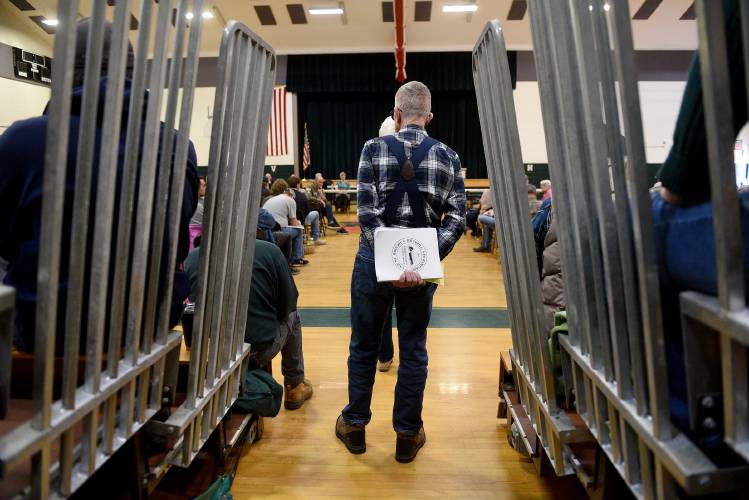
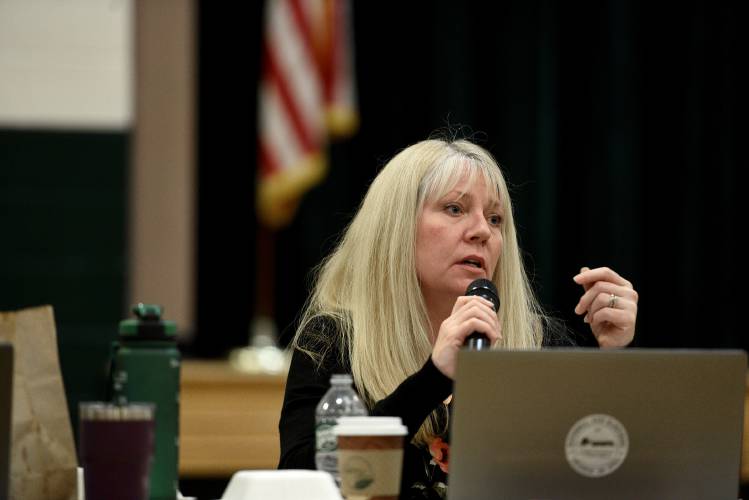
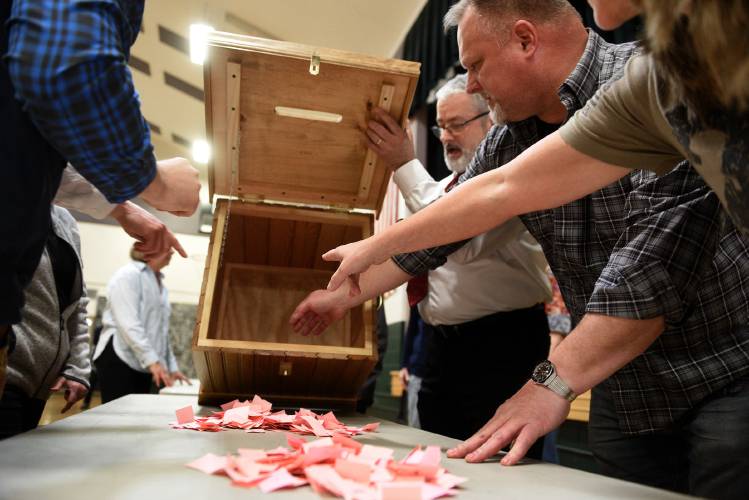
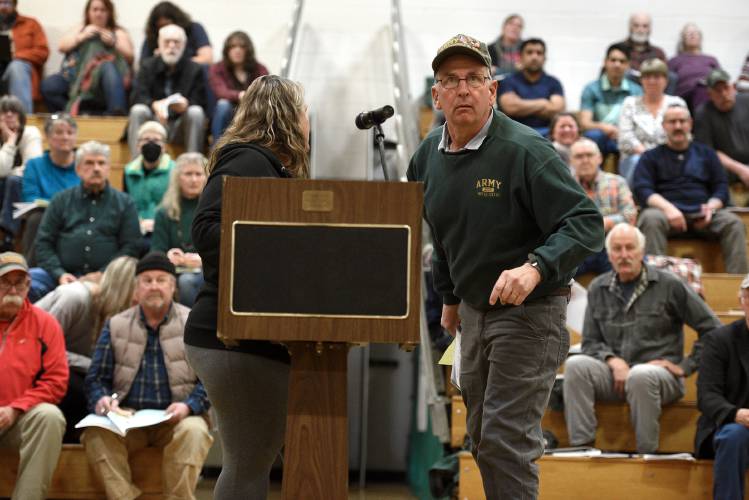
 Big drop in tuition and aid is boosting Colby-Sawyer
Big drop in tuition and aid is boosting Colby-Sawyer 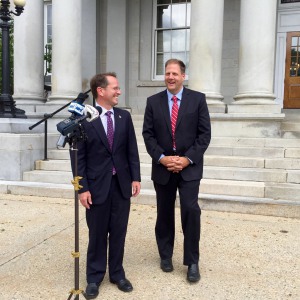 How NH Education Commissioner Frank Edelblut used his office in the culture war
How NH Education Commissioner Frank Edelblut used his office in the culture war
